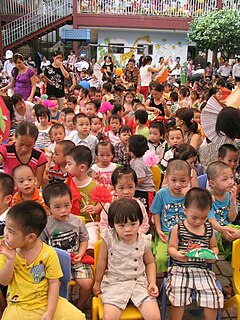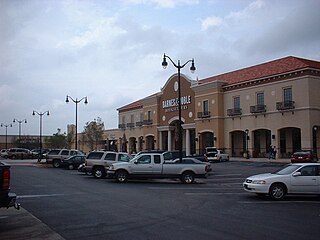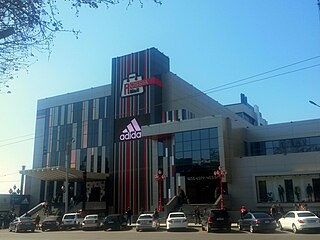Nordstrom Inc. is an American chain of luxury department stores, also operating in Canada and headquartered in Seattle, Washington. Founded in 1901 by Swedish American John W. Nordstrom and Carl F. Wallin, the company began as a shoe retailer and expanded its inventory to include clothing, accessories, handbags, jewelry, cosmetics, and fragrances. Select Nordstrom stores also include wedding and home furnishings departments. The company also has in-house cafes, restaurants and espresso bars.
Nordstrom, Inc.'s common stock is publicly traded on the NYSE under the symbol JWN.

Kindergarten is a preschool educational approach based on playing, singing, practical activities such as drawing, and social interaction as part of the transition from home to school. Such institutions were originally created in the late 18th century in Bavaria and Strasbourg to serve children whose parents both worked outside home. The term was coined by the German Friedrich Fröbel, whose approach globally influenced early-years education. Today, the term is used in many countries to describe a variety of educational institutions and learning spaces for children ranging from two to seven years of age, based on a variety of teaching methods.

Student-centered learning, also known as learner-centered education, broadly encompasses methods of teaching that shift the focus of instruction from the teacher to the student. In original usage, student-centered learning aims to develop learner autonomy and independence by putting responsibility for the learning path in the hands of students by imparting them with skills and basis on how to learn a specific subject and schemata required to measure up to the specific performance requirement. Student-centered instruction focuses on skills and practices that enable lifelong learning and independent problem-solving. Student-centered learning theory and practice are based on the constructivist learning theory that emphasizes the learner's critical role in constructing meaning from new information and prior experience.

A preschool, also known as nursery school, pre-primary school, playschool or kindergarten, is an educational establishment or learning space offering early childhood education to children before they begin compulsory education at primary school. It may be publicly or privately operated, and may be subsidized from public funds.
Early childhood education is a branch of education theory which relates to the teaching of children from birth up to the age of eight which is traditionally about third grade. It emerged as a field of study during the Enlightenment, particularly in European countries with high literacy rates. It continued to grow through the nineteenth century as universal primary education became a norm in the Western world. In recent years, early childhood education has become a prevalent public policy issue, as municipal, state, and federal lawmakers consider funding for preschool and pre-K. It is described as an important period in a child's development. It refers to the development of a child's personality. ECE is also a professional designation earned through a post-secondary education program. For example, in Ontario, Canada, the designations ECE and RECE may only be used by registered members of the College of Early Childhood Educators, which is made up of accredited child care professionals who are held accountable to the College's standards of practice.
The Reggio Emilia approach is an educational philosophy focused on preschool and primary education. It is a pedagogy described as student-centered and constructivist that uses self-directed, experiential learning in relationship-driven environments. The program is based on the principles of respect, responsibility, and community through exploration and discovery through a self-guided curriculum. At its core is an assumption that children form their own personality during early years of development and are endowed with "a hundred languages", through which they can express their ideas. The aim of the Reggio approach is to teach how to use these symbolic languages in everyday life. It was developed after World War II by pedagogist Loris Malaguzzi and parents in the villages around Reggio Emilia, Italy, and derives its name from the city.

A big-box store is a physically large retail establishment, usually part of a chain of stores. The term sometimes also refers, by extension, to the company that operates the store. The store may sell general dry goods, in which case it is a department store, or may be limited to a particular specialty or may also sell groceries, in which case some countries use the term hypermarket.

A retail park or power center is an unenclosed shopping center with a typical range of 250,000 square feet (23,000 m2) to 600,000 square feet (56,000 m2) of gross leasable area that usually contains three or more big box retailers and various smaller retailers with a common parking area shared among the retailers. It is likely to have more money spent on features and architecture than a traditional big box shopping center.

The Manulife Centre is located on the southeast corner of Bay and Bloor streets, along the Mink Mile and adjacent to the southern edge of the Yorkville district of Toronto, Ontario, Canada. It consists of a 51-storey 800-suite luxury residential tower at 44 Charles Street and a shorter tower at 55 Bloor Street West, connected by a retail complex on the main floor and basement.

In retail, an "anchor tenant", sometimes called an "anchor store", "draw tenant", or "key tenant", is a considerably larger tenant in a shopping mall, often a department store or retail chain. With their broad appeal, they are intended to attract a significant cross-section of the shopping public to the center. They are often offered steep discounts on rent in exchange for signing long-term leases in order to provide steady cash flows for the mall owners.
Mirdif is a residential area located in Dubai, United Arab Emirates.

Eastern Shore Centre is a 540,000-square-foot (50,000 m2) lifestyle center located in Spanish Fort, a suburb of Mobile, Alabama, at the intersection of Malbis Parkway and Interstate 10. A landscaped perimeter road, Eastern Shore Boulevard, connects the lifestyle and power center components of this hybrid regional center. An apartment community, The Arlington at Eastern Shore Centre, was developed in the northeastern section of the complex. Eastern Shore Centre is Baldwin County's first large-scale, multi-anchored regional shopping center and the first lifestyle center to open in South Alabama.
Sara Delano Roosevelt Whitney diBonaventura Wilford is a psychologist who taught at Sarah Lawrence College from 1982 to 2014.

City Centre Mirdif is a shopping mall in the residential area of Mirdif, in Dubai, United Arab Emirates. It opened on March 26, 2010, and is developed and managed by Majid Al Futtaim Properties. City Centre Mirdif has a gross leasable area of 196,000 m2 and houses 465 retail stores.
A learning store is a specialised retailer of materials expressly for the education and development of children of all ages. These materials include toys, books, games, building blocks and music, along with traditional teaching resources and curriculum materials. Some learning stores offer materials for developmentally disabled adults as well. The term learning store was coined in 1984 by the Golden Apple Learning Store. Large chains such as Early Learning Centre now exist and learning stores can now be found in many urban and suburban areas.

Dalma Garden Mall is an Armenian enclosed shopping mall. It is located near the Tsitsernakaberd hill in the Armenian capital Yerevan. It is the first mall in Armenia.

Children's World or Detsky Mir is a Russian children's retailer. Opened on June 6, 1957, as of February 2017, the company had 525 stores. Vladimir Chirakhov serves as CEO. It is the largest children's goods retailer in Russia and the CIS, with the retail chain in both Russia and Kazakhstan. Detsky Mir Group also owns the ELC retail chain in Russia. On February 8, 2017, PAO Detsky Mir listed its shares "in the first major initial public offering in Russia since the annexation of Crimea."

Rossia Mall is an enclosed shopping mall located on Tigran Mets Avenue in the Armenian capital Yerevan. It is the 3rd-largest mall built in Yerevan. The shopping centre was opened on 5 March 2016, with the presence of president Serzh Sargsyan. It has a direct access to the General Andranik underground station, adjacent to the Rossia Theatre.











